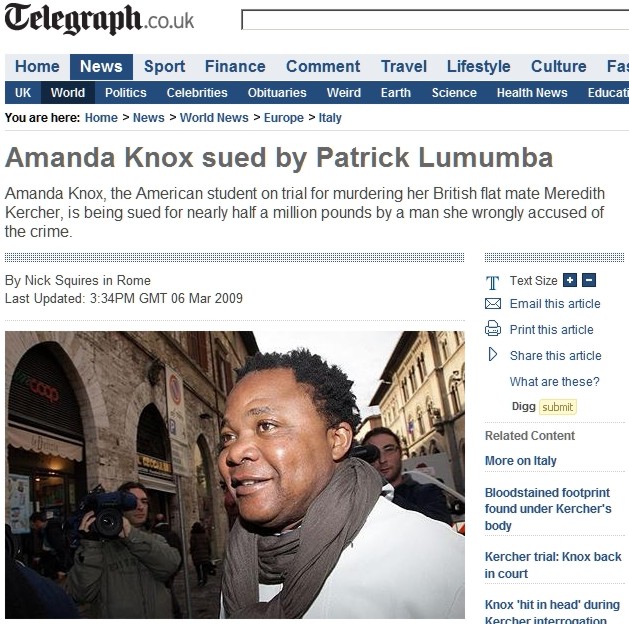
Category: 17 Fake memory hoax
Wednesday, January 25, 2012
The Curt Knox And Edda Mellas Diffamazione Trial Will Resume In Perugia 30 March.
Posted by Jools

First, here is an explanation of diffamazione.
The charge of calunnia (art. 368) has been commonly translated as “slander” in the English/US media. This translation is incorrect, however, as calunnia is a crime with no direct equivalent in the respective legal systems.
The equivalent of “criminal slander” is diffamazione, which is an attack on someone”Ÿs reputation. Calunnia is the crime of making false criminal accusations against someone whom the accuser knows to be innocent, or to simulate/fabricate false evidence, independently of the credibility/admissibility of the accusation or evidence.
The charges of calunnia and diffamazione are subject to very different jurisprudence. Diffamazione is public and explicit, and is a more minor offence, usually resulting in a fine and only prosecuted if the victim files a complaint, while calunnia can be secret or known only to the authorities. It may consist only of the simulation of clues, and is automatically prosecuted by the judiciary.
The crimes of calunnia and diffamazione are located in different sections of the criminal code: while diffamazione is in the chapter entitled “crimes against honour” in the section of the Code protecting personal liberties, calunnia is discussed in the chapter entitled “crimes against the administration of justice”, in a section that protects public powers.
The suit against Curt Knox and Edda Mellas will commence in earnest on 30 March.
That is two days after the scheduled start of the Sollecito family trial in Bari for alleged subversion of justice, and about six weeks after the prosecution lodges its grounds for appeal with the Supreme Court against the appeal verdict on Amanda Knox and Raffaele Sollecito.
The defamation charges were lodged not by the Perugia prosecutors’ office but by those who considered themselves to have been defamed. Under their rules they are required to do that to safeguard the system.
Amanda Knox is quoted as saying how much she likes Italy and how she would like to be at that trial.
Amanda Knox “loves Italy and likes Perugia”.
She wants to return as a tourist but, if necessary, she’ll do so to testify in the trial against her parents”. To say as much was one of the defenders of the American [female], lawyer Carlo Dalla Vedova. Words came in the space of the proceedings for defamation against the parents of the student from Seattle, which is taking place in Perugia.
The name of Amanda Knox was included in the list of trial witnesses that the defence for Kurt Knox and Edda Mellas, lawyers Dalla Vedova and Luciano Ghirga intend to call to testify in court. “Both are accused of libel through the press in an interview which appeared in 2009 on the website of The Sunday Times” in which they spoke of alleged abuses on her daughter at the police headquarters during the questioning for the investigation into the murder of Meredith Kercher. For which crime Knox was provisionally acquitted on appeal.
In the meantime today the single judge Giuseppe Noviello has rejected an instance by the defence in relation to the territorial incompetence of the Perugian judiciary in dealing with the court proceedings.
“Amanda - said Dalla Vedova - is very interested” in the trial hearings against her parents and to which she is accused of calunnia, also against the flying squad police agents”. With her lawyers she maintains a correspondence by e-mail and every now and then they speak on the phone. “We have not seen her again ““ explains Dalla Vedova - since she was acquitted and went back to the United States. At Christmas though we exchanged greetings and yesterday she sent me an email asking for information on today’s hearing. Tonight I will tell her how it went”.
For the record the hearing in question was then postponed to March 30. On that date the witness for the prosecution will be heard. Then will be the turn for defence witnesses.
Thursday, January 13, 2011
Claims Amanda Knox’s Confessions Resemble “False Confessions” Not Backed Up By Any Criminal Research
Posted by Fuji

[Above: Perugia’s central police station where Knox, Sollecito and Guede were all interviewed]
Meredith’s case is absolutely riddled with fabricated false myths.
They are now found by the hundreds on some misleading websites, and they simply make experienced law enforcement and criminal lawyers laugh.
For example “Police had no good reason to be immediately suspicious of Knox simply because the murder occurred at her residence”. And “The double-DNA knife is a priori to be disregarded as evidence, because no murderer would retain possession of such a murder weapon.”
One of the most strident and widespread myths is that Amanda Knox’s statements to the Perugian investigators on 5 and 6 November 2007, placing her at the scene of Meredith’s murder, are to be viewed as the products of a genuinely confused mind imbued with a naïve trust of authority figures.
The apparent certainty with which many of Amanda Knox’s most vocal supporters proclaim that Knox’s statements are actual “false confessions” as opposed to deliberate lies is not supported by even a cursory reading of the pertinent academic literature regarding false confessions.
What actually are “false confessions”?
Richard N. Kocsis in his book “Applied Criminal Psychology: A Guide to Forensic Behavioral Sciences” (2009), on pages 193-4 delineates three different kinds of false confessions:
First, a voluntary false confession is one in which a person falsely confesses to a crime absent any pressure or coercion from police investigators….
Coerced-compliant false confessions occur when a person falsely confesses to a crime for some immediate gain and in spite of the conscious knowledge that he or she is actually innocent of the crime….
The final type, identified by Kassin and Wrightsman (1985), is referred to as a coerced-internalized false confession. This occurs when a person falsely confesses to a crime and truly begins to believe that he or she is responsible for the criminal act.
The first problem facing Knox supporters wishing to pursue the false confession angle as a point speaking to her purported innocence is epistemological.
Although much research has been done on this phenomenon in recent years, academics are still struggling to come to terms with a methodology to determine their incidence rate.
The current state of knowledge does not support those making sweeping claims about the likelihood of Knox’s statements being representative of a genuine internalized false confession.
As noted by Richard A. Leo in “False Confessions: Causes, Consequences, and Implications” (Journal of the American Academy of Psychiatry and the Law, 2009):
Although other researchers have also documented and analyzed numerous false confessions in recent years, we do not know how frequently they occur. A scientifically meaningful incidence rate cannot be determined for several reasons.
First, researchers cannot identify (and thus cannot randomly sample) the universe of false confessions, because no governmental or private organization keeps track of this information.
Second, even if one could identify a set of possibly false confessions, it is not usually possible as a practical matter to obtain the primary case materials (e.g., police reports, pretrial and trial transcripts, and electronic recordings of the interrogations) necessary to evaluate the unreliability of these confessions.
Finally, even in disputed confession cases in which researchers are able to obtain primary case materials, it may still be difficult to determine unequivocally the ground truth (i.e., what really happened) with sufficient certainty to prove the confession false.
In most alleged false-confession cases, it is therefore impossible to remove completely any possible doubts about the confessor’s innocence.
The next problem Knox supporters face is that, even allowing for an inability to establish a priori any likelihood of a given statement being a false confession, the kind of false confession which is usually attributed to Knox is in fact one of the LEAST likely of the three types (Voluntary, Compliant, and Persuaded, as Leo terms the three different categories) to be observed:
Persuaded false confessions appear to occur far less often than compliant false confessions.
Moreover, despite assertions to the contrary, Knox and her statements do not in fact satisfy many of the criteria researchers tend to observe in false confessions, particularly of the Persuaded variety:
“All other things being equal, those who are highly suggestible or compliant are more likely to confess falsely. Individuals who are highly suggestible tend to have poor memories, high levels of anxiety, low self-esteem, and low assertiveness, personality factors that also make them more vulnerable to the pressures of interrogation and thus more likely to confess falsely…
Highly suggestible or compliant individuals are not the only ones who are unusually vulnerable to the pressures of police interrogation. So are the developmentally disabled or cognitively impaired, juveniles, and the mentally ill….
They also tend to occur primarily in high-profile murder cases and to be the product of unusually lengthy and psychologically intense interrogations… ordinary police interrogation is not strong enough to produce a permanent change in the suspect’s beliefs.
Most significantly, there is one essential element of a true Persuaded False Confession which in Knox’s case is highly distinctive:
To convince the suspect that it is plausible, and likely, that he committed the crime, the interrogators must supply him with a reason that satisfactorily explains how he could have done it without remembering it.
This is the second step in the psychological process that leads to a persuaded false confession.
Typically, the interrogator suggests one version or another of a “repressed” memory theory.
He or she may suggest, for example, that the suspect experienced an alcohol- or drug-induced blackout, a “dry” blackout, a multiple personality disorder, a momentary lapse in consciousness, or posttraumatic stress disorder, or, perhaps most commonly, that the suspect simply repressed his memory of committing the crime because it was a traumatic experience for him.
The suspect can only be persuaded to accept responsibility for the crime if he regards one of the interrogators’ explanations for his alleged amnesia as plausible.
Knox did not in fact claim drug or alcohol use as the source of her amnesia - rather, she claimed to have accepted the interrogators’ attribution that this was due to being traumatized by the crime itself, and she offers no other explanation for her selective amnesia:
This is from Knox’s statement to the court in pretrial on 18 October 2008 with Judge Micheli presiding.
Then they started pushing on me the idea that I must have seen something, and forgotten about it. They said that I was traumatized.
Of course, Knox’s initial statement went far beyond being that of being merely a witness to some aspect of Ms. Kercher’s murder, as the interrogators at first seemed to believe was the case.
Rather, her statement placed her at scene of the murder during its actual commission while she did nothing to avert it, which naturally made her a suspect.
In other words, in the absence of any of her other testimony which indicated that she was only a witness to the murder, her own self-admitted rationale for providing a false confession was that she was traumatized by the commission of the murder itself.
Perugia judges will be familiar with all of the above and we can be sure that they brief the lay judges on the remote circumstances and incidences of false confessions.
If I were a Knox defense attorney, I would find it to be a far more fruitful line of argumentation to argue that she was simply lying, rather than claiming the supremely unlikely provision of an actual internalized false confession.
Friday, February 05, 2010
True Justice Is Rendered For Patrick Lumumba (Sort Of)
Posted by Tiziano

Above & below: Patrick’s bar which Knox managed to drive out of business.
1. Explanation of calunnia
Knox was prosecuted by the Republic of Italy, not by Lumumba, on a calunnia charge and her prison sentence was extended when she was found guilty of that.
The charge of calunnia (art. 368) has been commonly translated as “slander” in the English/US media. This translation is incorrect, however, as calunnia is a crime with no direct equivalent in the respective legal systems.
The equivalent of “criminal slander” is diffamazione, which is an attack on someone”Ÿs reputation. Calunnia is the crime of making false criminal accusations against someone whom the accuser knows to be innocent, or to simulate/fabricate false evidence, independently of the credibility/admissibility of the accusation or evidence.
The charges of calunnia and diffamazione are subject to very different jurisprudence. Diffamazione is public and explicit, and is a more minor offence, usually resulting in a fine and only prosecuted if the victim files a complaint, while calunnia can be secret or known only to the authorities. It may consist only of the simulation of clues, and is automatically prosecuted by the judiciary.
The crimes of calunnia and diffamazione are located in different sections of the criminal code: while diffamazione is in the chapter entitled “crimes against honour” in the section of the Code protecting personal liberties, calunnia is discussed in the chapter entitled “crimes against the administration of justice”, in a section that protects public powers.
2. Knox Defense
Knox took the stand for two days during her trial, of course, trying to explain why she did what she did to her kindly former employer.
She only seemed to dig herself in deeper.
3. Patrick’s Win
Now Terni In Rete confirms his government compensation for his several weeks in Capanne and some damaging badmouthing.
CASSATION: EIGHT THOUSAND EUROS FAIR COMPENSATION FOR PATRICK LUMUMBA
February 4th, 2010
By Adriano Lorenzoni
The fourth criminal session of the Court of Cassation has established that the sum of eight thousand Euros is fair compensation for Patrick Lumumba, the Congolese involved in spite of himself in the murder of the English student, Meredith Kercher.
Lumumba was dragged into involvement by Amanda Knox, and precisely because of her statements spent 14 days in prison. Then the elements gathered by the investigators completely exonerated him. For that unjust imprisonment Lumumba had requested damages of 516 thousand Euros.
In the trial for the murder of Meredith Kercher, Amanda Knox was condemned to 26 years imprisonment, her ex-fiancé, Raffaele Sollecito to 25.Knox, precisely for her false accusations against Lumumba, was condemned to the payment of damages of the sum of 50 thousand Euros with an interim award, immediately applicable, of ten thousand Euros. Neither Lumumba nor his lawyer wished to comment on the decision of the Court of Cassation.
Sunday, June 14, 2009
Italy Shrugs: Why Amanda Knox’s Testimony Seems To Have Been A Real Flop
Posted by Nicki

Posting from Milan (image below) where we also have been watching Knox testify in Italian.
Here are just three of the disbelieving headlines on the testimony that have been appearing in the Italian press.
- All of Amanda’s wrong moves (La Stampa)
- Amanda growls but Patrick bites (Il Giornale)
- Amanda: I am innocent. But many “I don’t remembers” start popping up (ANSA)
As many of us were expecting, Amanda’s testimony has backfired. She came across not as confident but arrogant, not as sweet but testy, not as true but a fake who has memorized a script, an actress who is playing a part but not well enough to fool the public.
It is true that the Italian media and public opinion in general have not been very benign with Knox. But not for the reasons that the American media seem to want to push.
Let’s make it clear, Amanda Knox is not on trial because Italians are unaccustomed to or even “jealous” of her freedom and lifestyle”¦ The first time we read these “explanations” we found them quite laughable.
But for many or most Italians the initial amusement has now given way to a profound irritation. Amanda Knox’s lifestyle is shared by hundreds of thousands of Italian girls, who like partying and sex as much as she does - or even more - and they live a happy carefree life with no fear of being perceived as “bad girls.” They behave no differently from any other girl of the same age in America or in any other Western country.
Dear American media, welcome to the 21st century and to globalization! Please put aside pseudo-romantic and passè vision of a country where all men chase American girls because Italian women are not as approachable for “cultural” reasons: Italian men are into foreign girls no more but no less than Italian girls are into foreign boys.
They generally greatly like Americans because of their great interest and curiosity for a country and its people that many Italian youngsters have only known through books or movies. Amanda Knox is not on trial because she is American and therefore too “emancipated”. She could even be from the North Pole as far as Italians are concerned.
What really matters to them is to find the truth about Meredith’s murder and to do real justice for her terrible death. Italians don’t much like Amanda primarily because they perceive her as a manipulative liar, who is suspected of having committed a heinous crime for which there is a whole stack of evidence - and they perceive this even more-so after this last week’s court hearings.
In addition, the US media’s seemingly endless bashing of the Italian justice system, and of the whole country, most recently by CBS and ABC, has definitely made things worse.
The Italian police are NOT known to be particularly violent - although, agreed, it may happen when they’re dealing with violent males suspects from Eastern Europe or Africa, or in the streets when they have to deal with a riot. Violence is NEVER used with white, female college students from Italy, America or elsewhere.
And Italy is a sovereign state with a great juridical tradition. Receiving condescending lectures by the media of a country where the death penalty is still applied in many states comes across as more than insulting - it is utterly ridiculous. Before you judge the “backwardness” of the Italian justice system, you should at least first read Cesare Beccaria’s amazingly humane Of Crimes And Punishments (written in 1764) and perhaps you’ll reconsider.
If the American media just cannot understand that there are alternatives to the “American way “, that may not be so bad after all. But they should at least show some respect for a foreign, sovereign state and its people.
If the media can’t even manage to do so - and they really want to help Amanda - the best thing to do now is to go quiet and let the Italian justice work at its pace and according to its own principles. If Amanda is only guilty of arrogance, callousness and narcissism, she will be free soon.
Dear American followers of Meredith and, for that matter, also friends of Amanda Knox. May I speak right to you, and right past the media?
There has been no character assassination, no demonization, no great wave of hate and revenge, no mad prosecutor, no Satan theory of the crime, no invented evidence, and no massive bumbling.
What there has been is a whole stack of evidence and a VERY careful process. Kernit in effect described all the evidence in his extraordinary 150 questions.
And on Friday and Saturday, Amanda Knox for better or worse chose to answer NONE of them.
Friday, March 06, 2009
Patrick Lumumba Seeks Damages For His Time In The Big House
Posted by Peter Quennell
Click above for the story.
Knox is being tried on a charge of calunnia for her false implication of Patrick (see an explanation of calunnia at bottom). Patrick was of course the owner of the Le Chic bar, now closed because of the heap of trouble that his former waitress Amanda Knox dropped on his head.
He was held in Capanne Prison for about two weeks as a suspect, after she alleged (voluntarily, in writing) that she had seen him in the house on the night of the crime. And heard Meredith’s screams as he committed the murder.
Might he perhaps not have been so ticked if she had recanted the accusation any time in the next two weeks? Maybe. Maybe not. But Knox might easily have done. Nobody was pressuring her to do otherwise.
This seems an open-and-shut case. The evidence is all there. So Knox lives and learns. We hope.
Explanation of calunnia
The charge of calunnia (art. 368) has been commonly translated as “slander” in the English/US media. This translation is incorrect, however, as calunnia is a crime with no direct equivalent in the respective legal systems.
The equivalent of “criminal slander” is diffamazione, which is an attack on someone”Ÿs reputation. Calunnia is the crime of making false criminal accusations against someone whom the accuser knows to be innocent, or to simulate/fabricate false evidence, independently of the credibility/admissibility of the accusation or evidence.
The charges of calunnia and diffamazione are subject to very different jurisprudence. Diffamazione is public and explicit, and is a more minor offence, usually resulting in a fine and only prosecuted if the victim files a complaint, while calunnia can be secret or known only to the authorities. It may consist only of the simulation of clues, and is automatically prosecuted by the judiciary.
The crimes of calunnia and diffamazione are located in different sections of the criminal code: while diffamazione is in the chapter entitled “crimes against honour” in the section of the Code protecting personal liberties, calunnia is discussed in the chapter entitled “crimes against the administration of justice”, in a section that protects public powers.




